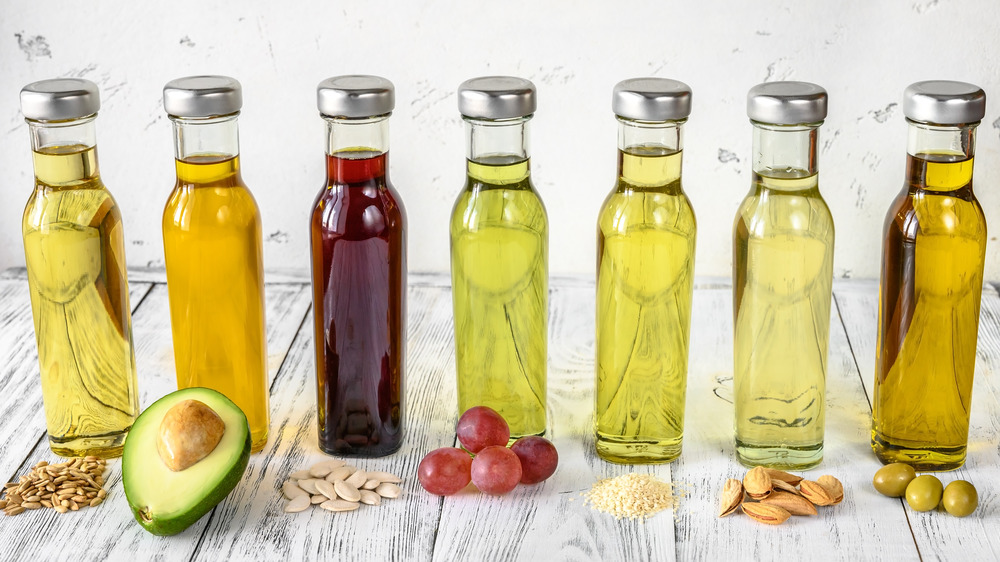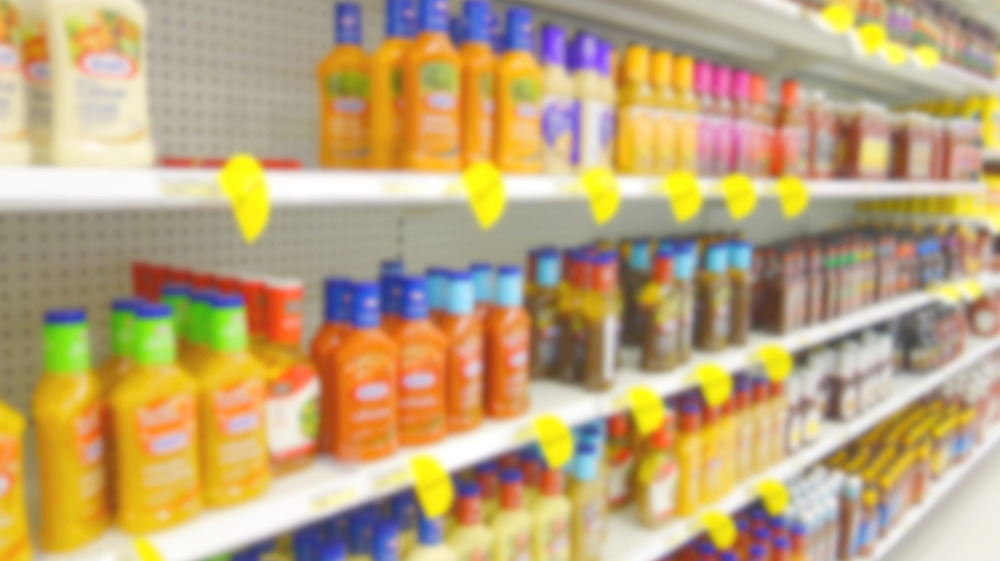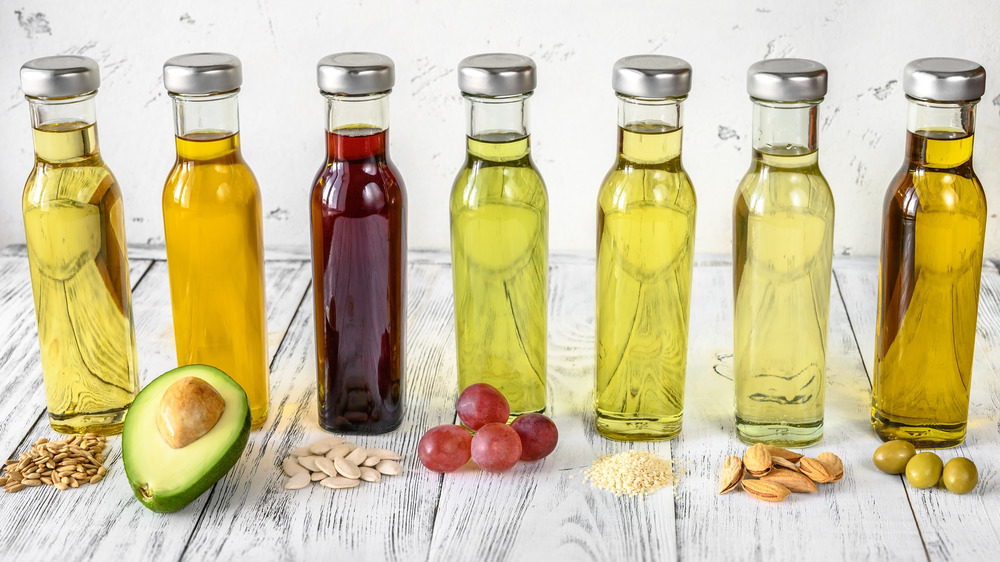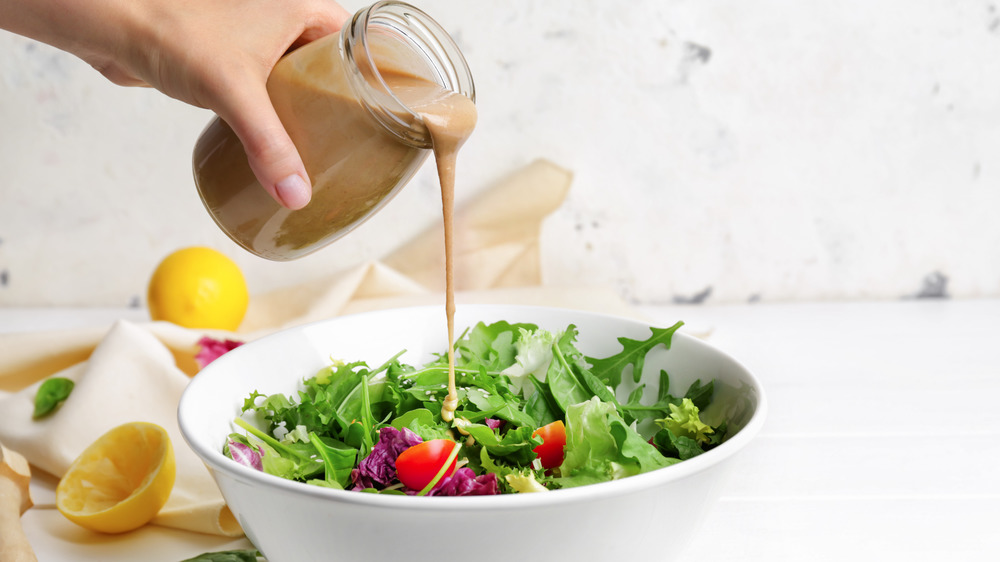Why You Should Rethink Eating Non-Fat Salad Dressing
Salads on their own, especially if they just consist of lettuce and maybe a few chopped veggies, can be quite nutritious as well as low in calories, carbs, and processed ingredients. The fact is, though, that most salads need a little something in order to make them palatable. While salads can do without cheese, croutons, or bacon bits, the one thing they really need to transform them into something you'd actually enjoy eating is some type of dressing. Hence the compound word "salad dressing."
Salad dressing, however, can be problematic, since it often adds back in all of the fat that the salad itself may lack. While a salad dressing made with olive oil may be a great source of heart-healthy fat, it is going to add on some calories, so dieters are often tempted to use non-fat dressing instead. Serena Poon, a professional chef, nutritionist, and the founder of wellness website Serena Loves, says that non-fat dressings may be a no-no. "If a salad dressing is labeled non-fat," she tells Mashed, "it is honestly a red flag. This label usually means that a salad dressing contains a long list of food-like substances, rather than real food ingredients. "
Fat-free dressings contain a laundry list of dubious ingredients
There's a lot of potentially scary stuff being used to replace the fat these dressings lack. As Poon tells it, "a little bit of fat adds a lot of flavor, so its absence leads food companies to get creative with non-fat products," and warns that the tasty fats are often swapped out for sugars and processed ingredients. One of the potentially unhealthy ingredients she warns about is the dreaded high fructose corn syrup, an excess amount of which Poon says may be linked not only to obesity but inflammation, diabetes, heart disease, and liver disease. Fat-free dressing may also contain preservatives which, despite being considered "generally safe" by the FDA, could possibly lead to cardiovascular and digestive issues and maybe even ADHD. Dressings can also contain artificial colors that have potential links to cancer and behavioral issues in children.
Yet another reason why Poon says to steer clear of fat-free dressings is how long and unrecognizable their ingredient lists tend to be. Real food, good food, is made from stuff you'd actually recognize, like, say, oil and vinegar. On the other hand, Poon warns, "the longer and more complex a list of ingredients on a packaged food, the further from real food these items become. Our bodies thrive when we eat food in its natural form."
Fat is a necessary part of your diet
Poon calls fat "an important macronutrient that does not need to be avoided," and says that rather than trying to steer clear of fat in all forms, you should instead be "pay[ing] attention to what kind of fat you are consuming." Most types of unprocessed, plant-based types of fats, she tells us, will do us far more good than harm, naming seeds, nuts, and avocados as some of those healthy fats we should be seeking out. (All of these just so happen to taste great in salad). Plant-based oils, as well, which are the kinds of fats we typically use to make salad dressings, are also something we don't want to skip.
According to Poon, "a small amount of salad dressing made from high quality oil, such as avocado oil or cold-pressed olive oil may actually help make the nutrients from your salad become more bioavailable." A 2017 study performed by researchers from Iowa State University (via ScienceDaily) seems to support this, as subjects who ate salad with a soybean oil-based dressing were better able to absorb eight different micronutrients from their salads than those poor souls who had to eat their salads dry. What's more, the study found that the optimal amount of oil to add to your daily diet was about two tablespoons, so there's no need to make half a teaspoon of dressing stretch to cover your whole salad.
If you still want to stay fat-free, stick to DIY dressings
Poon, of course, recommends that you make your own food in preference to using pre-made, store-bought versions of anything. As she explains it, "If you make your own food at home, you know exactly what is going into your food." She also says that it allows for using fresher ingredients, something that tends "deliver more flavor and feelings of nourishment."
So, okay, homemade salad dressings are better, got it. If you're still determined to slash every last calorie from your salad and want to stick with low-fat options, though, what does Poon suggest? She says, "It is absolutely possible to make a healthy version of a fat-free honey mustard dressing," and even allows that some store-bought versions of this dressing may be both low-fat and relatively healthy (check the labels).
If you're not a fan of honey mustard, there are plenty of other options for making your own dressings. Ingredients such as pureed tomato, hummus, pureed tofu, and low-fat yogurt can make for good dressings. If you experiment with your own combos, you may even see additional benefits. According to Poon, the act of preparing your own foodstuffs "adds a level of appreciation and joy to your meal, which can make eating feel more satisfying."



